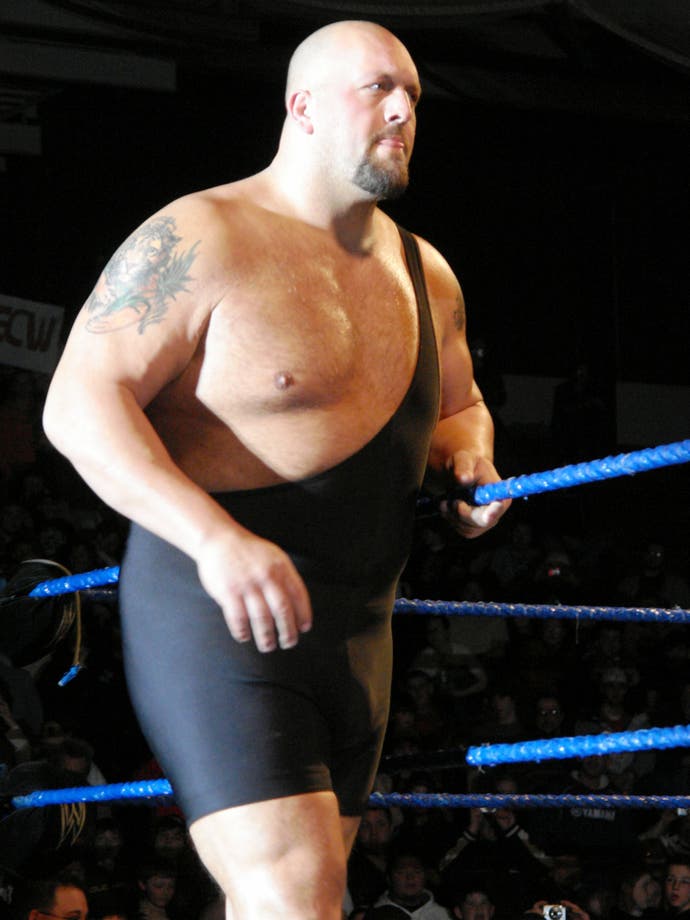Me and WWE
When Tom met Paul.
Jericho's heel skills are almost unrivalled – his garrulous diatribes against the "gelatinous parasites" in the audience beautifully complement his in-ring combination of arrogance and comedy cowardice.
Wight is a monster when he's a heel: his right hook is a signature finishing move that KOs opponents and he is almost impossible to topple. He sells his performances as well as anyone in the business, which is harder when you're a big man. (Try doing the throwing-yourself-to-the-ground routine I mentioned earlier with a fridge strapped to your back.)
He points out that Jericho is retired (having sustained a real-life injury last September on RAW) and we chat about the tag team division. I then ask him whether Scottish wrestler Drew McIntyre really talks the way he does in the ring (he sounds like a Scotsman doing a bad impression of a Scotsman), and Wight laughs and says he does.
We also discuss his injuries. Wrestling injuries can be horrendous. At the Elimination Chamber pay-per-view in 2009, The Undertaker was approaching the ring when somebody responsible for the pyrotechnics hit the wrong button. The wrestler received second-degree burns on his back.
Throwing his smouldering jacket to the ground, he marched to the ring and gave a performance rich in the kind of pageantry that only he can sell, masking his agony until he stripped his leotard to the waist late in the match. "You and I know what that's about," one of the TV commentators joked. Joked. Because it's all part of the business: you work through the pain, whatever happens.

So I ask Wight about the worst injury he's ever had to endure in-ring. He tells me about herniated discs, but the most painful story concerns a pay-per-view triple-threat match (three contenders battling simultaneously). He had three bone chips floating in his knee, which was fused, and he was due to receive an operation the next day. He wore padding and worked.
During the onstage Q&A, Wight speaks hauntingly about his respect and affection for André. He tells the audience and his fellow professionals that even being mentioned in the same sentence as his hero is an honour beyond reckoning and that he could not hope to live up to that legend.
As I'm sitting with him later, a PR person signals me that I have one last question. I look down at my pad – the questions on it include stuff loosely associated with the game I haven't asked him about. I can hear Eurogamer news editor Wesley Yin-Poole thousands of miles away willing me to ask something that can end up in a headline, like what he thinks of Homefront.
I say: Paul, when you were up there with the other wrestlers just now, I thought you spoke with great humility and respect about André, and I understand why you did that, and what André must mean to you and why you would feel the way you do. But it's important that you understand: I didn't grow up with André, and nor did a lot of people of my generation who watch WWE, and the emotions you feel for him are the ones we feel for you.
At least, that's what I try to say. I think he gets the point, because he seems moved and says thank-you in that gentle way that we reserve for the times we're accepting a compliment we want to remember without exhibiting immodesty.
The interview is over. I get up and have a rubbish picture taken with him. I wish now that I'd hugged him for the photo – it would have looked impish and confident. Instead I look like a total dork. But it doesn't matter, because I've just talked to Paul Wight for five minutes and he trusted me with his thoughts and memories. He broke kayfabe for me.
Wight's ring name is The Big Show. A few minutes earlier, I walked towards him and he held out his hand. It was the size of a dinner plate and with fingers like rolling pins. It utterly enclosed mine in a firm but gentle grip.
"Hi, I'm Tom," I said, trying not to grin from ear to ear.
He didn't say, "Hi, I'm The Big Show." He said, "Hi, I'm Paul."
I almost cried.

